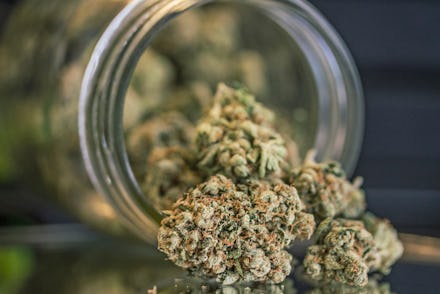The UN has finally removed weed from its dangerous substances list

The U.N. voted to reclassify cannabis yesterday, which means that it has been removed from the list of "most dangerous substances." While most of us have probably never thought of weed as a hard drug, cannabis has been classified as such by the U.N. since 1961, CNN reported. Cannabis will still be considered a restricted use substance, but now the U.N. has officially recognized that cannabis has medicinal benefits. Here’s what you need to know.
This is a largely symbolic move. This reclassification by the U.N. Commission on Narcotic Drugs may not have any impact on how individual governments control cannabis any time soon, according to CNN. This vote is an important symbol for the growing move to legalize cannabis in the U.S. and other countries that are part of the U.N., but some drug policy experts say that it doesn’t go far enough in addressing the legacy of colonial and racist drug policies.
“We welcome the long overdue recognition that cannabis is a medicine,” Anna Fordham, the executive director of the International Drug Policy Consortium, said in a press release. “However, this reform alone is far from adequate given that cannabis remains incorrectly scheduled at the international level. The original decision to prohibit cannabis lacked scientific basis and was rooted in colonial prejudice and racism.” In other words, yes, this may make things easier for cannabis capitalism, but it doesn’t really do anything to heal the wounds created by cannabis colonialism.
Around the world, cannabis control has been a tool that colonial forces have used for centuries to stigmatize and subjugate Black and indigenous people while simultaneously making a profit, and this new vote does nothing to repair that. “It [The U.N.’s original stance on cannabis] disregarded the rights and traditions of communities that have been growing and using cannabis for medicinal, therapeutic, religious, and cultural purposes for centuries and has led to millions being criminalised and incarcerated across the globe,” Fordham continued, explaining that she felt the U.N. review process had been a “missed opportunity” to correct that historical error.
In the U.S., marijuana policies have been used to oppress, control, and penalize hispanic and Black people, and while this vote may be a move towards decriminalizing and legalizing cannabis that helps end our racist war on drugs, it’s really not enough. It seems like we still really need to talk about reparations for the victims of this war.
Meanwhile, medical marijuana industry insiders are thrilled. “The message that the [vote] sends cannot be overstated,” Alfredo Pascual, an analyst for Marijuana Business Daily, told CNN. But the truth is that this is — as usual — a mixed message that sounds revolutionary but actually seems consistent with a very traditional imperialist message: You can have cannabis, but only if we can control who gets it and who makes money off of it.